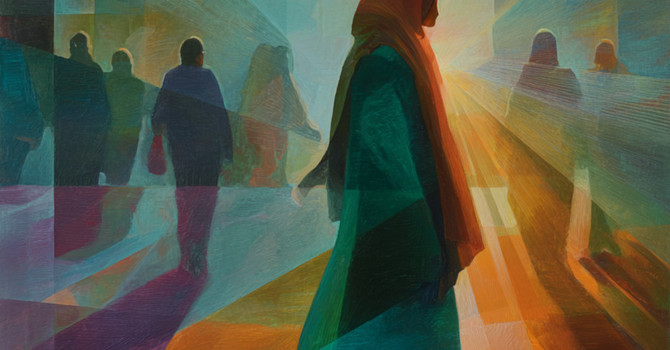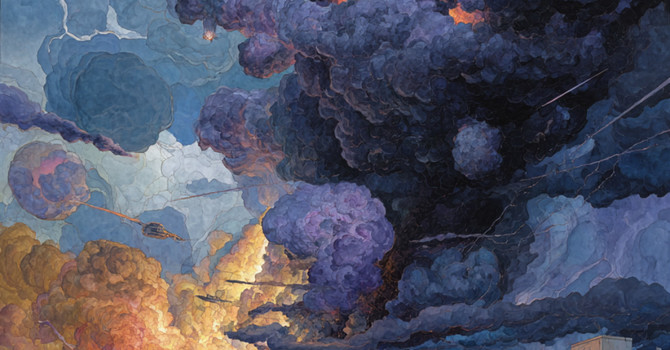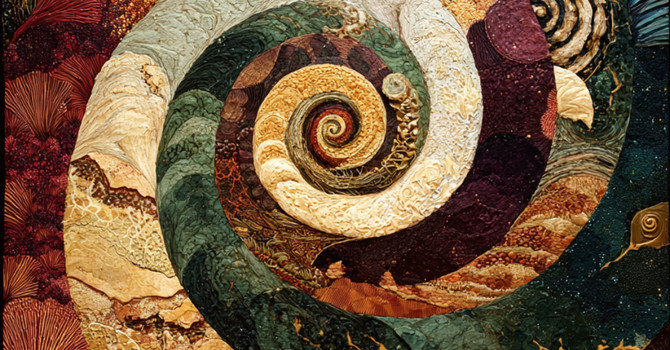
I have spent the last year attempting to clarify more thoroughly some of the operative principles and practices of Hikma Medicine from my own understanding and practice. One part of what has come out of that process is this concept of the 7 H's of Hikma.
What these 7 principles represent are the essential inner orientations of a Hikma Medicine practitioner. The doctor/healer/therapist is never a mere 'professional'. Of course, one must be professional. This is a component of one of the H's- Haal; one must be in a state of integrity. But being a professional does not encapsulate the essence of one's role and responsibility in this vocation. One can be a professional and utterly ignorant or disconnected themselves from the higher order of health and wholeness that one is attempting to connect their patients to. This is part of the reason why professionals may have many degrees and credentials, yet not be able to affect inspiration, hope, and change in their patients.
I contend that the 7 principles are: Hikma, Hayat, Hilm, Hudur, Haal, Husn al-dhan & Hasbiyya. The following will be a short explanation of each along with an example of how it affects the clinical dynamic. It should be noted that there is a natural overlapping of applied meaning between the 7 principles and that this should further demonstrate the rich matrix of truth that we are attempting to elucidate.
Hikma- Wisdom
يُؤْتِى ٱلْحِكْمَةَ مَن يَشَآءُ ۚ وَمَن يُؤْتَ ٱلْحِكْمَةَ فَقَدْ أُوتِىَ خَيْرًۭا كَثِيرًۭا ۗ وَمَا يَذَّكَّرُ إِلَّآ أُو۟لُوا۟ ٱلْأَلْبَـٰبِ
He grants wisdom to whoever He wills. And whoever is granted wisdom is certainly blessed with a great privilege. But none will be mindful of this except people of deep understanding.
[Quran, Al-Baqara: 269]
It seems natural to start with Hikma as it is the core theme of the paradigm. Hikma is wisdom: one of the cardinal virtues that hakims (healers), philosophers, and theologians like Imam Ghazali have posited as being the archetypal virtues from which all other moral principles are derivates thereof; the other three cardinal virtues being courage, gentleness (another of the 7 Principles), and justice.
Wisdom can be understood as the inner faculty that perceives the hidden order of things and their interconnectedness. It is a type of meta-knowledge that not only perceives the particulars of a thing but also its natural associations and range of influences upon and from other particulars. Wisdom thus allows one who embodies it to 'see' the 'true nature of things' as perceived by the intellect and understand the individual components that make up a constellated pattern of meaning.
This proves useful in the clinical environment as it contextualizes a patient and his/her condition beyond what may be obviously apparent on the surface. Through one's insight and wisdom a healer can begin to see the multiplex influences on the patient including their constitution and lifestyle determinants, social environment, and spiritual state. This insight moves the horizon of perception from the mere symptoms to the greater phenomological matrix of interconnected meanings, influences, and potentialities by which a resonance between the healer and the patient may form. This resonance naturally accompanies mercy (rahma) and establishes the base dynamic through which the theraapeutic potency of a clinical encounter can be tapped.
Hilm- Gentleness
The Messenger of Allah ﷺ said, “Allah is Halīm and loves forbearance in all matters.”
[Sahih Bukhari & Muslim]
The Messenger of Allah ﷺ said, "He who is deprived of forbearance and gentleness is, in fact, deprived of all good".
[Sahih Muslim]
Gentleness is another of the cardinal virtues and an indispensable characteristic in the nature of the healer. Hilm is the capacity to hold the totality of another person's state without changing one's essential relationship to them regardless of what they may say, do, or admit. This is a form of 'spaciousness of soul' by which one does not become scattered or frazzled by what one may encounter in another, maintaining nonjudgment and an open heart with the other.
Gentleness is an essential condition for establishing safety in the clinical space. One can imagine that if someone shows up as rough, crude, and otherwise ungraceful in their manner towards another, the natural consequence of this will be a closing up and brewing of mistrust in their interior. This sabotages any good that may have come otherwise by constricts the patient's chest and rendering the door to deeper invitation of connection effectively lost.
Now imagine another practitioner who shows up with an agreeable disposition, a soft countenance, and a lightness of heart- one's heart naturally expands towards them! And it is this expansion of heart that makes, in part, what is possible of the good being sought.
Haal- State
'One's haal (state of heart) transmits to others.'
[Sh. Abdul Rahman Ash-Shaghoury]
In the Islamic understanding of the nature of influence one learns that it is not the mere physical that can affect change but also the spiritual. Believers are not materialists. We are taught in our tradition the importance of moral integrity (adab) because we are just as responsible for our inner forces as we are the outer forces of word and deed.
The state of the healer must be one that is clear of one interjecting their own nafsani material into the space- what is normatively called transference- malice/malintent, or even distraction from the real moment. One should be in a balanced, mild state that is receptive to the other, warm, and inviting.
It should be noted that one's state (haal) exists and cannott (and should not) be sanitized away. Western trained professionals, especially psychotherapists, are often pressured by their supervisors into fearing transference to such a degree that they try to remove themselves from the clinical space as much as possible, sanitizing the germs of their unwanted influence. I see this as an error. As by attempting to do this one often gives the impression to the patient that one is rigid, hiding something, or otherwise aloof. It creates the energetic environment of a cold, clinical laboratory feel as opposed to the warm and lush natural environment one should be seeking to create.
In our world, physical forces move physical objects. But physical forces cannot move inner forces. And if we are attempting to aid the shift of the interior structure of the patient into one that is more whole and vital, it must be an inner force that facilitates the liminal space by which transformation can occur.
This inner force is one's haal.
Hayat- Life
The universe exists as meanings wrapped in forms // Whoever perceives this reality is of those of inner discernment
[Sh. Muhammad ibn Al-Habib]
The principle of Hayat refers to the life principle that is flowing within all created things. The scholars of our tradition are widely unanimous in holding a vitalistic, rather than an atomistic or mechanistic, conception of human nature. From Imam al-Ghazali in the traditional era to Syed Naquib al-Attas of our contemporary time, inheritors of Prophetic knowledge maintain that within every created particular in the universe is a subtle spiritual reality, a life force, which has not only intellectual and spiritual faculties but also a connection to and quwwat (powers) that act within the physiological, structural, and emotional zones of the human being.
Syed Naquib al-Attas in his Prolegomena says on this:
"The soul possesses faculties or powers (quwwa) which become manifest in its relation to bodies. In plants they are the powers of nutrition (al-ghadhiyyah), growth (al-namiyyah), and generation or reproduction (al-muwallidah). These powers, in their general and not their specific senses, exist also in animals; and in man, whose body belongs to the animal species, there are powers of volition or action at will (al-muharrikah), and perception (al-mudrikah) in addition to those of nutrition, growth, and reproduction.
All of these powers belong to the soul, and in view of their common inherence generally in the different bodies as well as their separate inherence specifically in accordance with the natures of the different species, the soul is somewhat like a genus divided into three different souls respectively: the vegetative (al-nabatiyyah), the animal (al-haywaniyyah), and the human (al-insaniyyah) or the rational (al-natiqah)."
It is of vital importance for the healer to develop their perception of the multiplex manifestation of the life force (hayat) in their patients. This is functionally what a healer is doing when they are they are assessing the 'totality of the organism'. What they mean is that there exists a life force that may speak different languages in the form of sensation, behavior, thought, affect (emotion), image, meaning, relationship, etc, through the patient, and that their role is to listen to all of these derivative manifestations and hold them in a unity such that a deeper understanding and pattern may emerge that represents the totality and through the knowledge of which the healer may feel directly into the state of the patient and administer medicine/care.
Working with the life principle is a pillar of the vision and practice of the Hikma Medicine practitioner.
Hudur- Presence
The Messenger of God ﷺ said, "The believers are mirrors of one another."
[Adab al-Mufrad]
"The Sufi is the son of their moment (ibn al-waqt)."
[Mawlana Rumi]
Similar to haal, presence speaks to the need of the healer to be present wherever they are.
God is Good. Existence is essentially good. And the real world in creation is the world of the heart and that of the fitra- the innate order of wholeness, goodness, and vitality that exists within all existents- and it is this matrix of reality that the healer must cultivate an anchor in.
The invitation of the healing journey is a return to this innate order and a healer must be continually seeking and deepening their own personal connection to it for the sake of their own health and salvation as well as that of their service to others.
When one is present themselves with God and their own hearts, one holds open a door as well as mirror for their patient to feel the hope and light that awaits them. They begin to remember and feel for themselves the beauty and aliveness that they have lost and their yearning and resolve to struggle for it fills them anew.
In this way, the healer must lead by example.
Husn al-dhan- Seeking Goodness
Abu Huraira reported: “The Prophet ﷺ loved goodly optimism and he would reject evil omens.”
The Prophet ﷺ loves optimism. Optimism was of the adornments of his character and one of the fragrances of his beautiful mannerisms when amongst the people, especially when visiting the sick. This is so much the case that even to this day the most commonly used prayer that Muslims say when visiting loved ones and friends at the hospital is, "No worries this is a purification for you, God-willing!"
We believe that if pathology and disturbance are darknesses that enter the constitution, disrupting the faculties and weighing down the body, then the natural orientation should be light-heartedness, optimism, having a good opinion of God and the healing process, and reminding one another of the Good that exists at the essence of existence.
Husn al-dhan also plays a roll in the lack of judgment towards the patient. It is unbecoming for the healer to make conclusive judgments of the patient in response to their sharing of their struggles and pain. Not only is this a serious lack of adab for the one seeking spiritual excellence but it is a total breech of code amongst the healers who have maintained oaths amongst themselves for millenia to never allow that sort of negative and unproductive energy into the therapeutic space.
It should be noted that judgment is held as unbecoming because essentially it can only happen from a conception of separation between the healer and the patient. If one is seeing the other as separate from oneself, one breaks the unity and state of presence that one is supposed to be fostering.
This unity is everything. As is not believing anyone to be better than oneself.
Hasbiyya- Reliance on God
"God is Sufficient for us, He is our Protector"
Tawhid (oneness) is just as much a therapeutic reality as it is a theological reality. It is of the essential and discriminating features of Hikma Medicine, in regards to other schools of thought, that we do not 'sanitize' the sacred from the healing space.
For the Hikma Medicine practitioner and patient alike, there must be a regard for God in the healing process. Every Muslim has knowledge and a knowing of God being the Creator and Orchestrator of every moment; so how can anyone in their right mind not acknowledge that majestic reality and harmonize with it as an essential level of truth and beauty, health and harmony?
For both practitioner and patient alike, surrender to God at the threshold of the healing space is a nod to the Real and the belief that all that is sought is within His generous hand. It is a nod to all of existence's utter need of God of every moment, whether they are aware of it or not. Hasbuna Allah wa ni'm al-Wakeel ( God is Sufficient for us, He is our Protector) becomes a rallying cry for the believers in need of God's mercy, favor, gentleness, and healing.
The reality of hasbiyya also helps remove the pressure off of the practitioner to feel the need to 'do' something. Efforting and other similar counter-transference dynamics are often amplified in an practitioner's psyche who has yet to anchor himself/herself in their utter need and reliance. This is not to be understood as a cover for a lack of clinical knowledge and skill but as a necessary component that optimizes the practitioner access to them.
Without the pressure to 'do', the practitioner surrenders and can subsequently 'be'. And is not 'to be', the answer to the question?
--
These are the 7 principles of Hikma Medicine. The practitioner must seek to develop these principles in parallel to their clinical knowledge to find their balance and create the conditions for fruitful service to mankind.
I pray that these principles serve you, whether you are a healthcare professional or not, and offer an invitation to us all to deepen our reliance on God, anchor our presence within our own hearts, maintain hopeful awareness of the Good in all Life through a state of gentleness and perpetual seeking of His wisdom.
May we all be healing witnesses for one another and this ailing world; a world which needs this healing now more than ever.
© Mazen Atassi, 2024
Dr. Mazen Atassi
Founding Director, Naturopathic Doctor, Homeopath, Somatic Trauma Counselor & Hikma Educator
Contact Me


